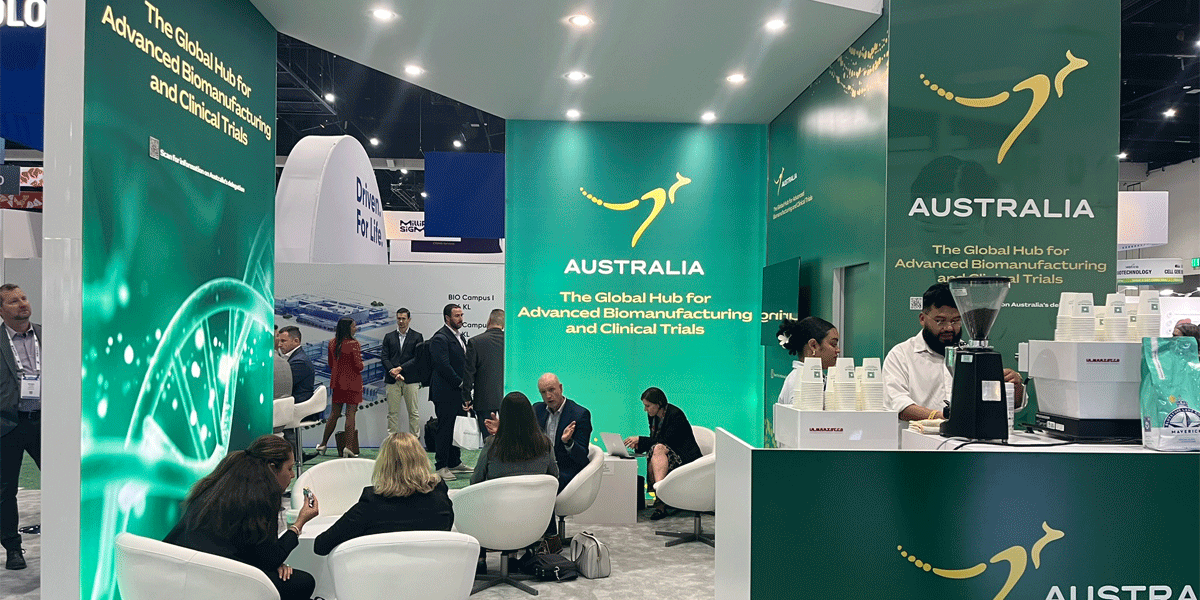 Image source: Bio24
Image source: Bio24Sharing our vision to establish one of the Asia Pacific’s leading innovation precincts at Boggo Road was QIC’s focus at BIO24 in San Diego in June 2024.
BIO24 is the most influential annual, global meeting of international biotechnology and life sciences leaders. With 18,000 attendees all focused on the future of BIO – this was a powerful opportunity for QIC, as master developers of Boggo Road Innovation Precinct in Brisbane’s inner-south, to share our vision and hear from others working in the innovation space.
Chris Brown, QIC Cross River Rail Precincts Director, and Erin Clark, Development Director for Boggo Road Innovation Precinct, met with leading research institutions, industry and investors to explain how the precinct will address the major translational life science challenges of our time. (Translational science is the process of ‘translating’ a laboratory discovery into commercially available treatments, devices and therapies for patients and communities.)
What is the vision for Boggo Road Innovation Precinct and what will it do?
At QIC, our focus is to create shared value for Queenslanders, so as master developer of the Boggo Road Innovation Precinct, we’re excited about this opportunity to create a space that will bring together like-minded, talented people and new ideas to create bold health and environmental solutions that benefit the world.
The Boggo Road Innovation Precinct is already an innovation hub in its own right, anchored by globally recognised medical and scientific research institutions, including the Princess Alexandra Hospital, Ecosciences Precinct, Translational Research Institute (TRI), and the UQ Dutton Park campus. It is the founding site of ground-breaking research and development expertise with a translational focus, e.g. the Gamma Knife®, Gardasil, mosquito sterilisation, avocado disease control research, vaccine development and the latest MRI technology.
QIC’s ambition for the Boggo Road Innovation Precinct is for it to become a super connected community that inspires idea exchange and accelerates them into collective progress. On completion, it will be the only translational-led precinct of its kind in Australia.
We envision an authentic neighbourhood with real social energy, based on shared amenity and services and superior connectivity in all its forms. The precinct will be a place where future success stories are made and where we celebrate and commercialise the work of people who will change the world.
What did QIC takeaway from BIO24?
1. Successful precincts focus on five key areas
Successful precinct developments prioritise the following:
- People
- Capital
- IP – tech transfer
- Facilities and desirable places
- Legislation to support industry.
2. Government support and alignment with policy drives confidence and investment
We can’t create world class innovation precincts alone. Government policy alignment, for example industry attraction policies, will cement our ability to grow translational science. The value of Australia’s Research and Development tax incentives were highlighted in several sessions.
The presence of the Hon Ed Husic, Federal Minister for Industry and Science as well as the Consul General, Tanya Bennett at BIO24 sends a strong message to our global counterparts that translational science is supported at the highest levels and gives confidence in our strong governance and regulatory model.
From a Californian perspective on creating successful clusters (Bio24 was held in California), the state’s strategic policy decisions – focused on attracting and retaining biotech businesses – were key to the sector’s success. California has many major industries – entertainment/film, agriculture, wine and tourism – but the biotech sector is bigger than these four industries combined.
3. A one team approach makes our offering stronger
A unified precinct development strategy underpins Boggo Road Innovation Precinct. Collaboration between university, government and industry will deliver our vision of a cohesive hub – connecting a rich cluster of innovators, working together for the common good and to the benefit of Queenslanders and people everywhere.
This unified team approach was reflected in our participation at BIO24. Attending as part of the Queensland delegation, under the Team Australia banner, we collaborated seamlessly. The conference offered real-time opportunities to strengthen relationships with all our stakeholders. Coming together in person better positioned us to accelerate opportunities and outcomes within Boggo Road Innovation Precinct.
An important goal within the precinct is to build stronger partnership ecosystems that leverage the various streams of research that already exist to create a more integrated precinct. The masterplan at Boggo Road Innovation Precinct will amplify the work of partners and encourage more collaboration, synergies, breakthroughs and retained commercialisation.
Additionally, the precinct’s location above the Boggo Road Cross River Rail station and its proximity to Brisbane Metro will ensure connection in the physical realm as well.
4. Achievement paves the way for further accomplishments
Boggo Road Innovation Precinct, and the broader Brisbane Knowledge Corridor, is already a world-leading science destination. The policy environment that ensures the efficiency of Australia’s early-stage clinical trials was highlighted as an attractor in sessions we attended at BIO24.
Emerging therapeutics and enabling technology companies growing in Queensland were also featured. Pitching at such a strong level internationally acts as an enabler and motivator for others. It reinforces the importance of amplifying and promoting our successes at every opportunity.
5. Bright Minds. Bright bio-future
‘Bright Minds. Bright bio-future’ – the tagline on our Queensland delegation partners’ collateral – is also a hallmark of this precinct. Our goal is to build a precinct that attracts the brightest minds. Top local and global talent are attracted and retained by a compelling ecosystem embedded within a thriving amenity-rich place that people want to visit and work.
Globally, other similar precincts have found that attracting, diversifying and retaining industry players depends on having a connected, compact precinct with high-quality amenities that encourage collaboration.
6. No one cares how much you know, until they know how much you care
A key takeaway from BIO24 was the importance of mission. As an attendee put simply – ‘no one cares how much you know, until they know how much you care.’
QIC, along with our precinct partners, will create a world-leading precinct that addresses major health care and life sciences challenges, and attract the best and brightest across the world. Establishing this clear vision and strategy will distinguish our precinct in a highly competitive market.
Why does biotech and life sciences matter to Queensland?
By 2026, Brisbane will be unique in terms of the amount of advanced health care services, education, training and research located within close proximity of the city. Its ecosystem of three tier one universities and a TAFE; four quaternary and three tertiary level hospitals; three medical research institutions; accredited medical, pharmacy, nursing and dental training schools will be a 12-minute travel time from each other and served by a high-frequency rail connection. This will deliver sustained social and economic value for the state and our community, accelerate our transition to a high-value knowledge economy and support healthier Queenslanders. In fact, by 2026, Queensland’s biomedical industry is forecast to employ more than 12,000 people and have a Gross Value Added (GVA) of $1.9 billion.*
QIC’s master plan is for the Cross River Rail project to physically tie together what’s called Brisbane Knowledge corridor which is a 5km zone with Boggo Road at the southern end and Herston at the north.
Find out more about QIC's role as master developer for the Cross River Rail above ground precincts.
Citations
*Source - Boggo Road Precinct: Building the Case for Change Report, Urbis, Feb 2023

